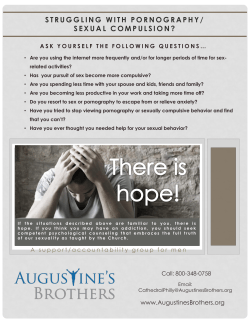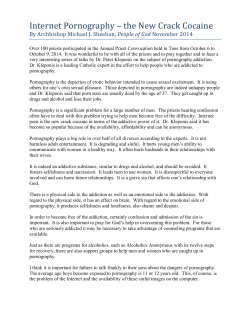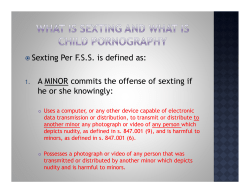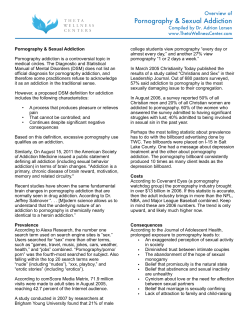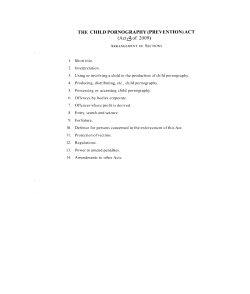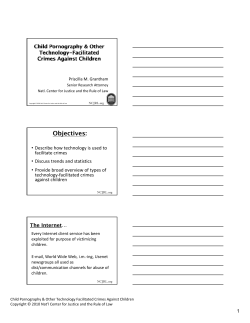
Laws Pertaining to Sexting in the Commonwealth of VA
Laws Pertaining to Sexting in the Commonwealth of VA Currently, the Commonwealth of Virginia could prosecute individuals, regardless of age, who are caught creating, distributing or possessing sexually explicit images of a minor under the State’s child pornography laws. Each action (creation, distribution, and possession) are independent of each other and can result in up to 3 separate felony charges. If convicted, individuals will generally be required to register as a sex offender. Legislative Summary In general, the distribution, possession or creation of an image containing a minor engaged in a sexual activity would constitute a felony under the Virginia child pornography statute. Exceptions to the law for minors do not exist and as such two minors who send each other sexually explicit images of themselves could be prosecuted under the Commonwealth’s child pornography laws and if convicted, receive jail time and will generally need to register as a sex offender. Sobering Reality Class 6 felony. Up to 20 years in jail. Register as a sex offender. Law and Punishment Virginia has three separate child pornography statutes (Production of Child Pornography, Possession of Child Pornography, and Distribution of Child Pornography) which prosecutors may use to punish individuals caught sexting. Production of Child Pornography • • • • • • Enticing a minor to be the subject of an image. § It does not matter if the minor consents to the image. Producing or preparing or attempting to take an explicit image of a minor. Knowing participates in the production of an image. Knowingly finance the image. § Just lending a phone that is used to take an image could be enough. Punishable by up to 20 years in prison if the minor is 15 years or older. If the minor is under 15 years old then up to 30 years in prison. Possession of Child Pornography • • Any person who knowingly possesses child pornography is guilty of a Class 6 felony. Conviction under the statute can result in up to 5 years in prison. Distribution of Child Pornography • • Any person who reproduces by any means, including by computer, sells, gives away, distributes, electronically transmits, displays with lascivious intent, purchases, or possesses with intent to sell, give away, distribute, transmit, or display child pornography with lascivious intent. Punishable of up to 20 years in prison. Advice for parents • • • • Don’t wait for an incident to happen to your child or your child’s friend before you talk about the consequences of sexting. Sure, talking about sex or dating with teens can be uncomfortable, but it’s better to have the talk before something happens. Remind your kids that once an image is sent, it can never be retrieved -- and they will lose control of it. Ask teens how they would feel if their teachers, parents, or the entire school saw the picture, because that happens all the time. Talk about pressures to send revealing photos. Let teens know that you understand how they can be pushed or dared into sending something. Tell them that no matter how big the social pressure is, the potential social humiliation can be hundreds of times worse. Teach your children that the buck stops with them. If someone sends them a photo, they should delete it immediately. It’s better to be part of the solution than the problem. Besides, if they do send it on, they're distributing pornography -- and that’s against the law. Source -‐ http://www.mobilemediaguard.com http://www.commonsensemedia.org http://studentservices.dadeschools.net For more information contact the Prince William County Police Department’s Crime Prevention Unit at 703-‐792-‐7270 or the School Resource Officer’s Unit at 703-‐792-‐4413
© Copyright 2025
